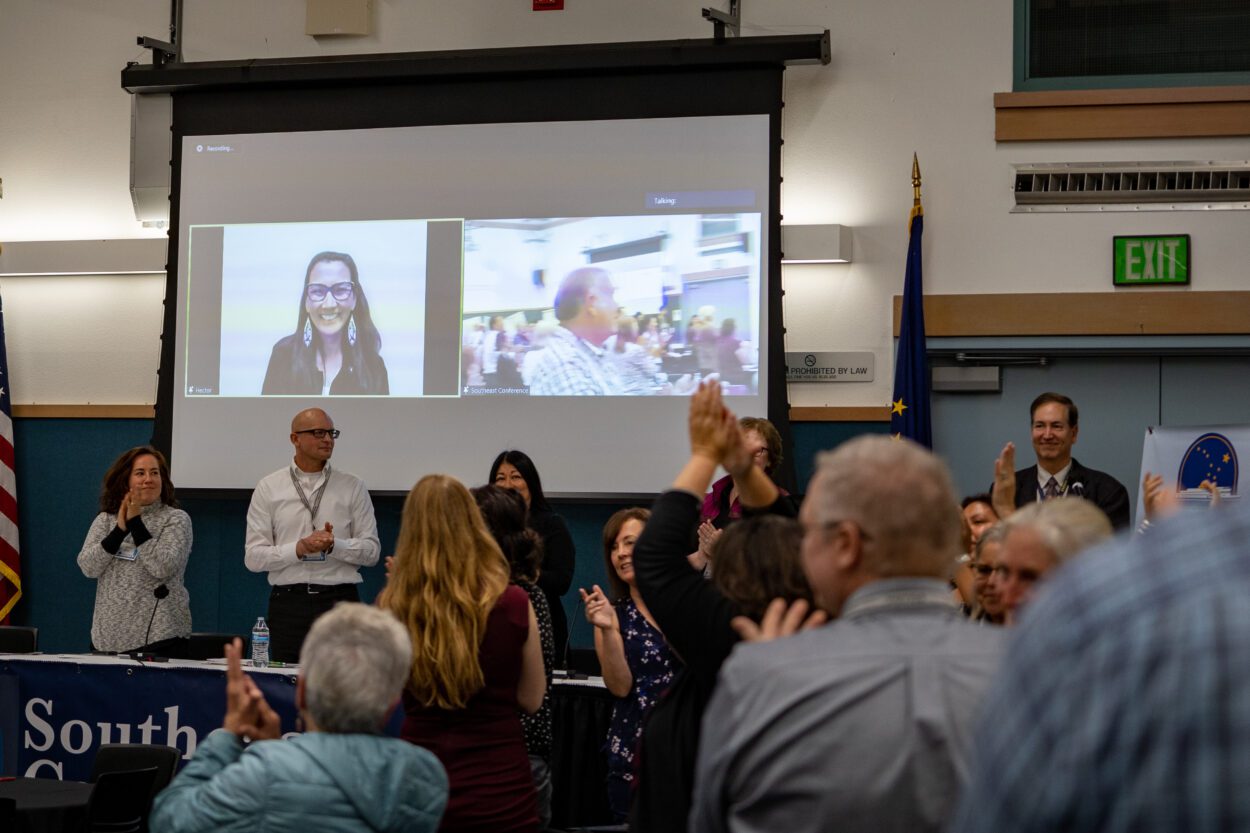
Newly-sworn in U.S. Representative Mary Peltola was met with a standing ovation during a virtual appearance in front of business and political leaders in Ketchikan on Thursday. Peltola’s challengers for the November U.S. House race squared off in a forum earlier in the day.
Robert Venables, the executive director of the regional economic development group Southeast Conference, welcomed Peltola during the final day of the group’s annual meeting. Peltola said it was her first official address to a group as the state’s new U.S. House representative.
Peltola, who is Yup’ik from the Yukon-Kuskokwim Delta, is the first Alaska Native person elected to Congress and the first woman to represent Alaska in the House. She said she’s been busy since she was sworn in just a few days ago.
“There are just nine days left for the House of Representatives to conclude their work, so we have a very tiny window to get some wins for Alaska. I’ve already been working with Congressman Jared Huffman from California on the reauthorization of the Magnuson-Stevens Act,” she said.
That’s the primary federal fisheries law that governs waters between three and 200 miles from shore.
Peltola said she’s also working to open up oil drilling in part of the National Petroleum Reserve – Alaska.
“Another priority of mine is to move the ball forward on opening Willow,” she said.
The Biden administration is expected to determine whether the proposed Willow project should move forward later this year. It’s estimated to produce 180,000 barrels of oil per day at its peak, according to ConocoPhillips.
Jodi Mitchell, a Sealaska Corp. board member and CEO of a utility that provides electricity to rural Southeast communities like Hoonah and Kake, congratulated Peltola.
“I’m so excited for you. And I’m going to be there next week,” she said. “I know you’re really busy, but I just want to find out how I can get in to see you.”
“Jodi, we’ll make sure that you and I have dinner when you come to town,” Peltola replied.
Peltola’s appearance came a few hours after a forum with her two Republican challengers for the U.S. House race in November. Peltola said she was busy with official duties and could not attend.
One of the topics Venables raised with Sarah Palin and Nick Begich was how the federal government should support housing and child care, two big needs identified in a survey of Southeast businesses. Palin said the feds should stay out of the issue — at most, she said, the federal government should give grants to the state to address those needs.
“I think that the federal government really shouldn’t have a role in either housing or childcare,” Palin said via Zoom. “That wasn’t a purpose of setting up the federal government.”
Begich, who attended the forum in person, took a different approach. He said the federal government could play a key role in opening up land for development.
“I think one of those things is to support roads, and bridge building, right? We have a tremendous source of land — it’s just over the channel, right? If we had a bridge in Ketchikan to Gravina Island, maybe we wouldn’t have such a problem with housing down here,” he said to laughter and applause, referencing Palin’s decision to kill the so-called Bridge to Nowhere.
“When you see politicians try to score political points by canceling the projects that this community relies on, that should tell you everything about where their priorities sit: It’s not with you. It’s with them,” Begich said.
Later in the forum, both Republican candidates took aim at earmarks, money set aside in federal spending bills for individual projects — like the Bridge to Nowhere.
Begich said he thought the feds should instead issue large grants to the state, which could then distribute the money as it saw fit.
“I’m not a supporter of the earmark process,” he said. “I think that it distorts some of the federal spending problems that we addressed earlier. But I do believe in local control, and I do believe that the state and local governments are in the best position to determine what priorities are.”
Palin offered a similar take.
“Earmarks are a problem in Congress. It leads to the crony capitalism, to the favoritism to the corruption in Washington DC, where politicians just tried to bring home the bacon to certain constituents in order to get reelected and re elected and reelected,” she said.
A recent poll shows a tight House race in November. The AARP Alaska survey shows Peltola with 45% of the first choice vote and 53% of the vote in the final round in a head-to-head matchup with Palin. Election Day is Nov. 8.





